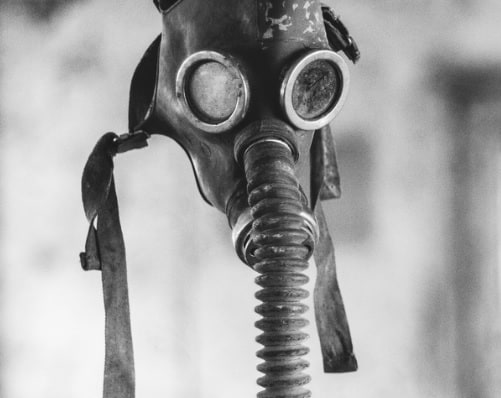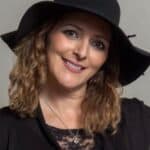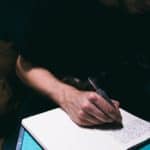Sometimes I Feel Like Chernobyl
– Nonfiction by Leanne Pierce Schneider –

I received the call on September 8, 2015 at 10:15 in the morning. My new life began in that moment with the words, “We have the test results back. I’m sorry, but it’s cancer.”
The first person I called was my mother, who was at home. Then I called my partner, wherever he was at the time. That detail escapes me now. I can’t remember if he was downstairs in the TV room or outside working. All I remember is the look on his face when I told him. Within minutes, my mother arrived at the house. We all sat in the living room, staring at the floor, the walls, the windows, but only glancing at each other. It was hard to see through all the tears anyways.
My doctor was waiting to meet with me. He was staying through his lunch break until my mother could drive me into town from my home in the country. My beautiful home on my beautiful horse farm beside a beautiful lake. I knew that once I left, I would be returning as a different person. Slowly, we made our way up the hill of my driveway. I looked out over the carpet of green pastures, filled with grazing horses, covered by a ceiling of pale blue sky, and I felt the me that was me, die.
We arrived at the doctors office. The secretaries ushered us right in, with those sad looks on their faces. You know the ones I mean, those pitiful expressions that they look at really sick people with. I had never been looked at like that before, because I had never been sick before. I was the healthiest person I knew. And now here I was, the sick person getting those sad, pitiful looks. I wished I could give everyone a facecloth so they could wash them right off their sad, pitiful faces.
My mother and I sat in the doctor’s office listening to him go on and on about surgeons and oncologists and genetic testing and chemotherapy and referrals to social workers and support groups and …
… and I wanted him to shut up. I wanted him to tell me he had made a huge mistake. I wanted him to suddenly look down at his computer screen and say, “Oh my gosh! This isn’t your chart! This is all wrong. You are fine! Now go home and keep doing what you were doing and just pretend this never happened.”
But he didn’t say that. He just kept talking about c-a-n-c-e-r. Stage 3 Triple Positive Invasive Lobular Carcinoma. Very aggressive. I wanted to plug my ears. I wanted to run away. I wanted the floor to open up and swallow me. That sounds like a cliche. But it was the truth. I remember thinking it, as I looked down at my skirt, at my shoes on the floor, at the legs of the chair, and wishing a great big earthquake would suddenly break the world apart and I would get lost in a huge crack and that would be the end of it. That would be the end of this stupid conversation in this stupid room on this stupid day.
But no earthquakes occurred that day. Shit like that never happens when you need it to. Instead, I listened to my doctor tell me I was “going to go on a journey.”
“You’re Going to Go on a Journey.”
That’s how doctors and the general population refer to cancer, as a journey. They make it sound like you’ve won some kind of big prize and are going to go on a cruise or a dream vacation or go backpacking across Europe to “find yourself”. Instead, my life revolved around hospitals, appointments, doctors, oncologists, nurses, blood collection technicians, MRI technicians, CT scan technicians, Bone Scan technicians, Heart Wall Motion scan technicians, Mammogram technicians, chemo nurses, surgeons, home care nurses, physiotherapists, lymphatic massage therapists and mental health therapists. The life that once belonged to me, now belonged to all the people who were trying to save it.
Over time, I got used to it. I began to accept that this was my new life. I began to view all the medical professionals who helped me, as my friends. The more time I spent with them, the closer I felt to them and they became my family. The hospital became my second home. I started to feel comfortable there. Safe. Taken care of. I felt like I never wanted to leave because the people there understood me. The outside world did not understand me anymore.
From September 2015 until January 2017 my life revolved around cancer. I underwent 6 brutal rounds of chemotherapy that almost killed me. I developed blood clots in my arm that required a 10:00pm trip to the emergency room and one month of blood thinners injected into my stomach. I developed a fever that required a 3:00am trip to the emergency room to diagnose a urinary tract infection. It required a round of triple dose antibiotics that I ended up being intolerant to, but I finished them anyways because I wanted to cure the infection. This ended up making me so sick that I had to take three different types of anti-nauseant drugs and was unable to eat or drink for days. I lost 15 pounds off my already naturally thin frame. I was also taking Tylenol 3 to treat the pain from the blood clot and the bone pain from the G-CSF drug they injected into my stomach to keep my white blood cell counts up. The home care nurses alternated the sides on my stomach everyday: blood thinner injection on one side, G-CSF on the other. My stomach slowly turned black and blue. We found out later, the Tylenol 3 was actually making me sick too, because I’m intolerant to opiates. This was discovered in March of 2016, when I had my mastectomy and they gave me morphine.
December of 2015 was the most challenging month I went through. So many things went wrong. I was so sick and frail. I was dehydrated and constipated. I spent all day in bed. I could barely walk and had to crawl across the floor on all fours, bald and thin. I thought I looked like Gollum, from The Lord of the Rings. Every time I looked in the mirror, that’s who I saw. So I stopped looking in the mirror. The saddest part about this time, is that it was December. My family was heartbroken to see Gollum slouched in a chair Christmas morning, trying to open presents. My mother cried when she looked at me sitting at the dining room table, trying to eat a piece of turkey and a spoonful of mashed potatoes. But I made myself eat it. For her.
In March of 2016, I had a modified radical mastectomy with removal of cancerous lymph nodes in my armpit. I continued the Herceptin infusions until December of that year. I was put on Tamoxifen for five years. The oncologists followed up with me until January of 2017. I continued physiotherapy for months, to regain movement in both arms; the left arm from the surgery and permanent lymphedema, and the right arm from the blood clots.
And then, just like that, it was over. They told me to “go back to my normal life.” They declared me “cancer free” and set me free into the world. A world that had moved on without me. A world that I didn’t know how to fit into any more. I felt abandoned and alone. Now that I was “cured”, people didn’t come around much. The messages stopped. My mailbox and inbox weren’t full of encouraging cards or notes anymore. Whenever I went out into public, people would say to me, “You must be so glad that’s behind you.” Or, “You must be relieved that’s over.” I would just look at them, not knowing what to say, and burst into tears. Because I wasn’t relieved and it wasn’t over and it wasn’t behind me. It was a part of me now. But nobody wanted to talk about that or acknowledge that. It seemed like nobody wanted to get too close to me. Nobody knew how to handle me or touch me. So they just abandoned me.
Almost two months after my mastectomy, I was scrolling through Facebook, and I discovered it was the 30th anniversary of the Chernobyl disaster. April 26, 2016. There were pictures posted of what the area looked like now. The abandoned buildings with the peeling paint. The desolation and decay. The emptiness and loneliness. The once beautiful and fun filled theme park, now all rusted and rotting, with broken pieces of equipment and dead leaves scattered on the ground. These were pictures of the Exclusion Zone. The toxic wasteland. Contaminated. Radioactive. Nobody knew what to do with it, so they just left it there. One of my mastectomy nurses was a “Chernobyl Baby”. She was brought to Canada by a host family, to be given a chance at a better life and to escape the radiation. She received her education here and was so grateful, that she decided to stay and give back to the country that helped her. So she became a nurse. And fortunately for me, she was my nurse.
As I scrolled through the pictures, it suddenly hit me in a very profound way … that sometimes I felt like Chernobyl. I was scarred, ruined, ugly, destroyed. I was a toxic wasteland. My body had been pumped full of radioactive dyes and my veins filled with toxic chemicals. Chemicals that left my paint peeling … my “paint”.
My fingernails. My skin. My hair.
Peeling off. Falling out.
And the poisoned part of me had been cut off completely, leaving me disfigured. The doctors had told me to go back to my normal life. Did everyone around Chernobyl just go back to their normal lives? My friends considered me recovered. Had Chernobyl recovered, 30 years later?
I was like the Exclusion Zone. Abandoned. Evacuated. Contaminated. Toxic.
I was the Exclusion Zone.
One picture in particular, really haunted me. It was a picture of a long, dark hallway in a hospital. There was peeling green paint and plaster falling off the walls and onto the floors. Garbage was strewn everywhere. At the very end of the hallway, there was a window with light coming through it. And I thought, how ironic, through all the ugliness and decay and darkness, there is a light at the end of that abandoned hallway. There is light at the end of the tunnel. And I thought of my Chernobyl nurse. And I thought of my Journey. And her Journey. And I realized, even in the toxic wasteland of Chernobyl, there is a tragic, devastated beauty. And it has a little light at the end of a hallway full of garbage and peeling paint.
And I decided that would be my next Journey… to reach that light.
About the Author – Leanne Pierce Schneider

Leanne Pierce Schneider lives in Yarmouth Nova Scotia, on an acreage with her horses. She has a daughter and a 4 year old grandson, who are the light of her life. She worked with children and families for 20 years, before turning her attention to showing horses at the Amateur Level with the American Quarter Horse Association. It was while traveling the horse show circuit in the USA, that she first became symptomatic for breast cancer. She is now living with Stage 4 Metastatic Breast Cancer that has spread to her brain, bones and other areas of her body. She has dreamed of being a writer since she was three years old. The cancer diagnosis has given her more time to devote to that dream. This is her first time being published.
Did you like this story, “Sometimes I Feel Like Chernobyl,” by Leanne Pierce Schneider? Then you might also like:
Count
Denise
Exploring Canyons
His Beautiful Death
Diamond in the Sky
This story, “Sometimes I Feel Like Chernobyl,” appeared in a recent issue of the Dreamers Magazine. Like reading print publications? Consider subscribing to the Dreamers Magazine!

Dreamers Writing Prompt Generator
Experience the power of simplicity with our unique writing prompt generator. Designed for writers who crave spontaneity and surprise, our tool delivers one meticulously crafted prompt at a time.

Top 25 Most Popular Manga Right Now
If you’re searching for the most popular Manga right now, this top 25 list is the ideal starting point, whether a beginner or enthusiast.